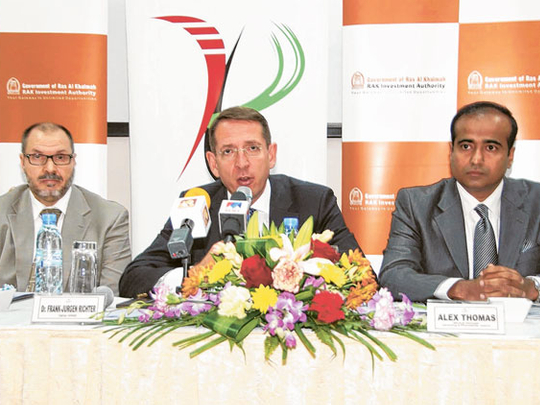
Ras Al Khaimah: The emirate of Ras Al Khaimah registered 800 new licences in the last eight months, a 31 per cent increase over the same period last year, according to an official from the RAK Investment Authority (Rakia).
Most were manufacturing licences, but there was a shift towards trading licences this year, said Alex Thomas, general manager of marketing at Rakia.
"There is a migration of companies from other GCC countries and the Middle East into Ras Al Khaimah, who are conscious about cost," he said.
Rakia, the government agency responsible for attracting investments to its free zones and industrial zones, saw 29 per cent of investment coming from India, 19 per cent from Europe and the Middle East, 15 per cent from the UAE and GCC, 3 per cent from the US and the rest from Africa and other sources, Thomas said.
Cheap destination
Rakia attracted $3.5 billion (Dh12.84 billion) since its inception in 2005 but figures for 2010-2011 were unavailable.
The emirate markets itself as one of the cheapest destinations to do business in the UAE — by about 15 to 20 per cent — and reduced its licence fees by 10 per cent last year, said Thomas.
The Ras Al Khaimah Department of Economic Development (RAK DED) has devised a new plan to co-operate with other emirates.
"We have a plan to liaise with the Ministry of Economy in other emirates to avoid negative competition between the emirates," said Dr. Djamel Bellout, director of planning and studies administration at RAK DED.
New companies opening manufacturing plants in Ras Al Khaimah include US-based insulation company ITW with an initial investment of $10 million, Indian vehicle manufacturers Mahindra and Mahindra and French glass manufacturer Alpha, Thomas said.
Foreign investment
Manufacturing is at the base of the emirate's economy, contributing 24 per cent to the local GDP in 2010 compared to 12 per cent in 2009, said Bellout.
The emirate is projected to grow at around 4.5 to 5 per cent this year, driven by the manufacturing and retail industries, Bellout said. Foreign investments into the Arab world have become "stagnant" since the Arab Spring but have not reduced dramatically in RAK, Thomas said.
Increased interest
Reduced investments from Europe were balanced by an increasing interest from India in the emirate, he said.
"Companies going to Egypt or Syria would definitely come here to cater to the GCC and Mena region and set up a manufacturing base. The cost of the workforce is cheaper, there is no labour union and companies can get workers from anywhere," he noted.
There is an expectation of increased interest from American companies looking for emerging markets in the light of American indebtedness, he said.
Rakia has arrangements with HSBC and Bank of Baroda to facilitate funds for the investment authority's clients, Thomas said.












